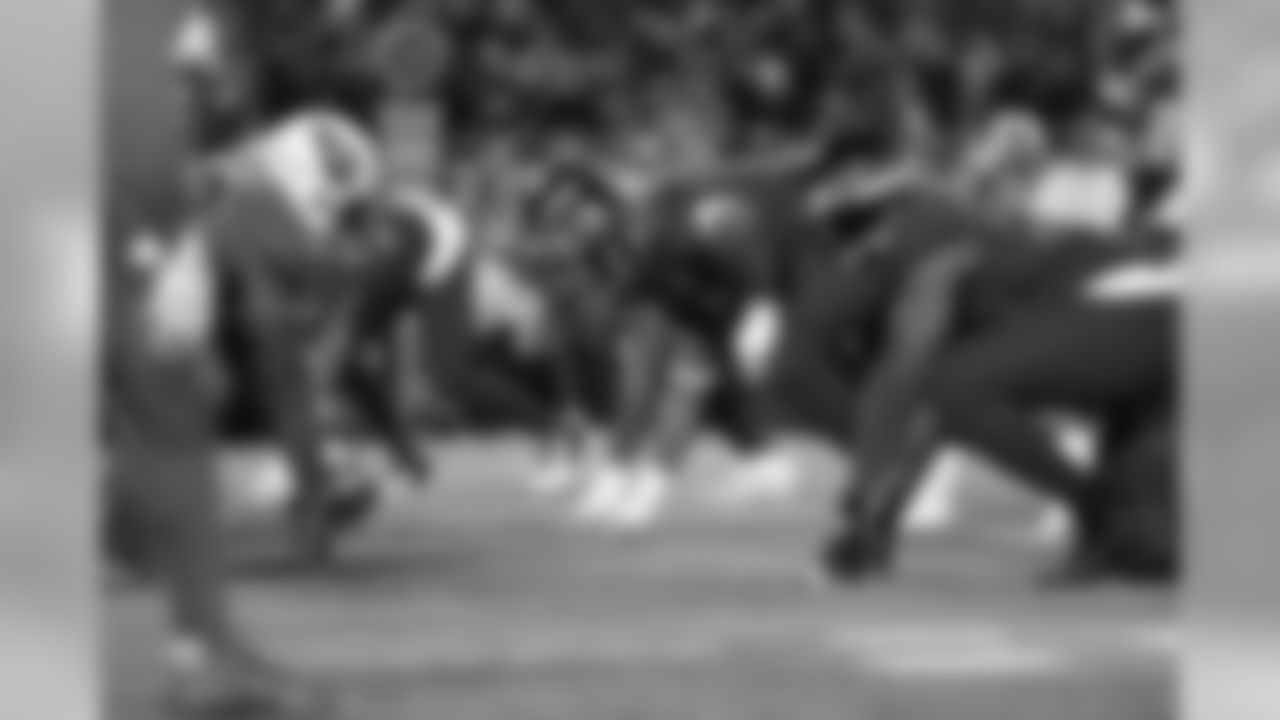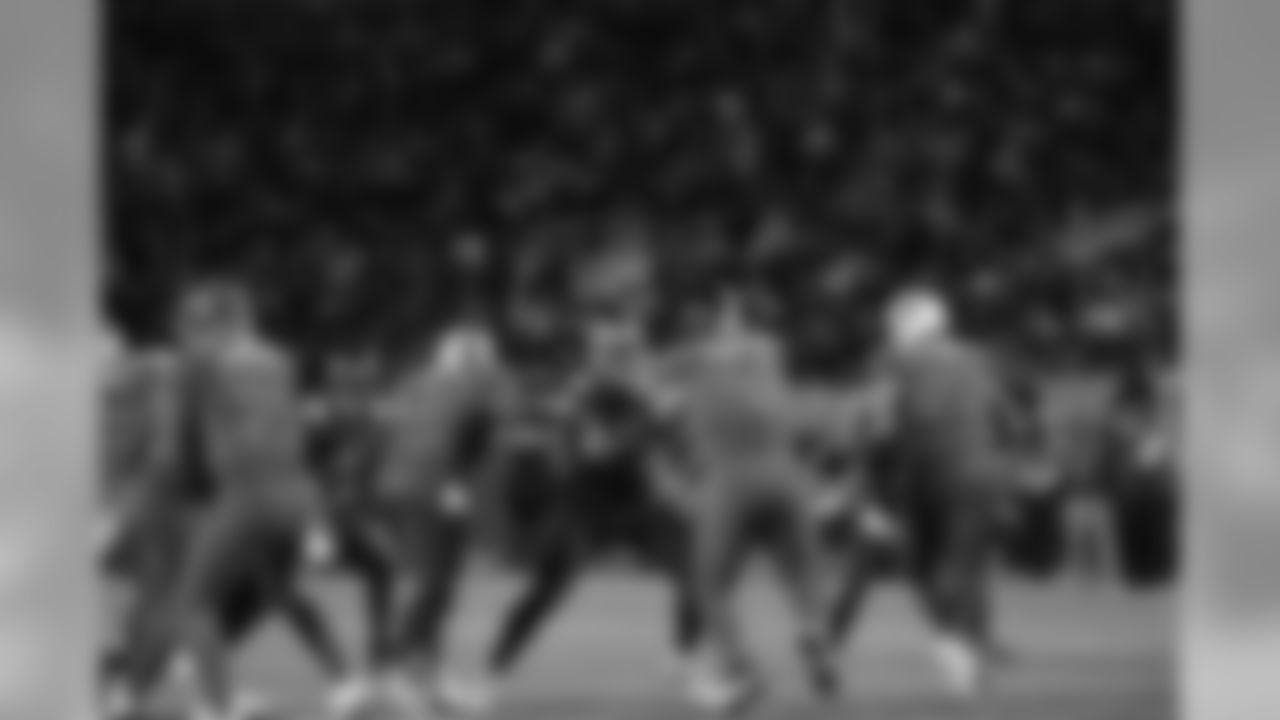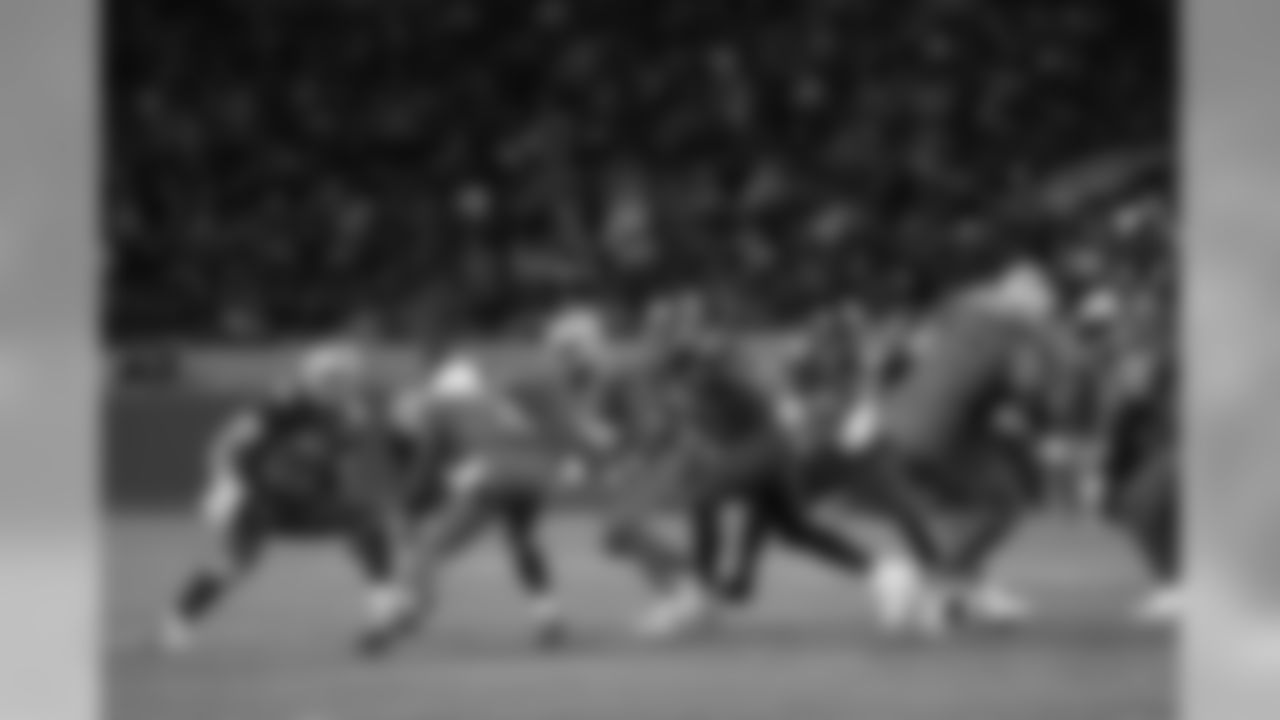When Mike Evans had his Pro Bowl status bumped up – almost inevitably – from first alternate to participant earlier this month, it granted him a unique spot in Tampa Bay Buccaneers history. Evans is not the first Buccaneer to play in more than one Pro Bowl, but he is about to become the first Tampa Bay wide receiver to be thus honored.
After he reeled in 96 passes for 1,321 yards and 12 touchdowns in 2016, his third NFL season, Evans was selected to his first all-star game. That was the fifth time a Tampa Bay wideout had been named to the Pro Bowl, following the selections of Mark Carrier (1989), Keyshawn Johnson (2001), Keenan McCardell (2003) and Vincent Jackson (2012). None of the first four made it to a second Pro Bowl as a Buccaneer, however. (Johnson, McCardell and Jackson had all previously been selected while with former teams.)
Given that Evans has already, at the ripe old age of 25, broken the franchise's career records for receiving yards and touchdown catches, it's not terribly surprising that he is setting new standards for Buccaneer pass-catchers in other ways, such as all-star recognition. It's likely that his second Pro Bowl selection will not be his last.
That said, Evans has a long way to go to catch the Buccaneers' all-time leader in Pro Bowl selections, when we expand our focus beyond just the receiver position. Who holds that record? Find out that answer and other bits of Buccaneer Pro Bowl history in the notes below as we prepare for the 2019 Pro Bowl this Sunday.
Pictures of WR Mike Evans and DT Gerald McCoy at the 2017 Pro Bowl in Orlando.

WR Mike Evans

DT Gerald McCoy and WR Mike Evans

WR Mike Evans and DT Gerald McCoy

DT Gerald McCoy

WR Mike Evans

DT Gerald McCoy

WR Mike Evans

DT Gerald McCoy

DT Gerald McCoy

WR Mike Evans

WR Mike Evans

DT Gerald McCoy

WR Mike Evans

DT Gerald McCoy

DT Gerald McCoy

WR Mike Evans

WR Mike Evans

DT Gerald McCoy

DT Gerald McCoy

DT Gerald McCoy

DT Gerald McCoy

WR Mike Evans

WR Mike Evans

WR Mike Evans

DT Gerald McCoy and WR Mike Evans
Annual All-Stars
Hall of Fame linebacker Derrick Brooks made his first Pro Bowl following the 1997 season and then kept returning to Hawaii (before the game was moved to Orlando in recent years) every season through 2006. He was skipped in 2007 but then made it back one more time in 2008, his final NFL campaign. That's a total of 11 Pro Bowl selections overall, which is the most in team history and tied for the 16th most in league history.
Defensive tackle Warren Sapp and fullback Mike Alstott also started long all-star streaks in 1997, the year the Buccaneers broke a 15-year playoff drought and kicked off an era of success that would lead to the franchise's first Super Bowl victory. Sapp's lasted seven years, through 2003, while Alstott was picked every year through 2002, streaks of seven and six years, respectively. Here are all the players who have been selected to at least five Pro Bowls as Buccaneers:
11: Derrick Brooks (1997-2006, 2008)
7: Warren Sapp (1997-2003)
6: Mike Alstott (1997-2002); Gerald McCoy (2012-17); Lee Roy Selmon (1979-84)
5: Ronde Barber (2001, 2004-06, 2008); John Lynch (1997, 1999-2002); Hardy Nickerson (1993, 1996-99)
In all, the Buccaneers have had players selected to the Pro Bowl 94 times. Nearly half of those – 44 selections – came during the seven-year stretch spanning that return to the playoffs in 1997 and the year after the team's Super Bowl win (2003).
MVP!
Our next question: Has any Buccaneer ever been named the MVP of a Pro Bowl? Answer: Same as above, sort of.
The Pro Bowl's postgame award has been known by a variety of names, including player of the game, most valuable player, most outstanding offensive/defensive player, and so on. Some years in the '60s and '70s, seemingly at random, the Pro Bowl decided to choose an "outstanding back" and an "outstanding lineman." In recent years, the league has taken to naming separate Offensive and Defensive MVPs.
By whatever name, these awards have only gone to a Buccaneer on two occasions, most recently to Brooks in the Pro Bowl played after the 2005 season. The first Tampa Bay player to take him such an honor was Selmon, who shared "player of the game" accolades with San Diego tight end Kellen Winslow in the Pro Bowl played after the 1981 season.
Brooks got his honor for bringing something to the Pro Bowl that is often lacking: Defense. His 59-yard interception return for a touchdown off a third-quarter pass thrown by Trent Green broke a 10-10 tie and was considered the pivotal play in the NFC's 23-17 win. The NFC picked off four passes in the game and racked up 192 total return yards while holding the AFC to 260 yards of offense. The game's combined total of 40 points may not seem that low, but the previous six Pro Bowls had featured an average of 73 combined points.
The Pro Bowl following the 1981 season was a low-scoring affair, too, though that wasn't unusual at the time. The AFC prevailed, 16-13, on a last-second Nick Lowery field goal and Winslow was honored for his six catches and 86 yards. However, the league also recognized Selmon from the losing team after he racked up an impressive four sacks. Coincidentally, those were four of the last NFL sacks that were "unofficial." The sack became an official stat in 1982.
A-Train Rumbles Through Honolulu
Tony Dungy and the Buccaneers' coaching staff ran the NFC team in the Pro Bowl following the 1999 season, and that squad included nine Buccaneers, the most the franchise has ever sent to one all-star game. Both were somewhat flimsy consolation prizes to the Bucs, who had come within minutes of beating the high-flying St. Louis Rams in the 1999 NFC Championship Game.
Dungy was not bashful about using his own players, particularly Mike Alstott. The A-Train and his Rams counterpart, Marshall Faulk, each carried 13 times for the NFC but Alstott's power runs were more effective, picking up 67 yards to Faulk's 39. More importantly, Alstott did what he always did best during his fantastic career in Tampa: He got the ball over the goal line when his team got close. Alstott scored three times, twice on runs of one yard and once on a three-yard rumble. That helped the NFC blow by the AFC, 51-31.
Alstott wasn't the game's MVP because Randy Moss racked up 212 yards and a touchdown on nine catches. The NFC also had five interceptions, compared to none for the AFC, and one of those was yet another pick-six by Derrick Brooks. Brooks, by the way, joins Ty Law as the only players in Pro Bowl history with two career interception-return touchdowns.
Brandon Marshall set the Pro Bowl record in 2012 with four touchdowns but Alstott remains the only player ever to score three rushing touchdowns in a single Pro Bowl.
Franchise Trailblazer
The Buccaneers began play as the NFL's 27th franchise in 1976 but did not have a player named to the Pro Bowl after their first two seasons. That wasn't particularly surprising given that an unforgiving roster-stocking system in the pre-free agency era led to a talent drain and 26 straight losses before the team's first victory in 1977.
The Buccaneers did have a player selected for the Pro Bowl following their third campaign in 1978, and that player was defensive tackle Dave Pear. Pear had come to the new franchise in Tampa in 1976 as part of the "veteran allocation draft" that helped fill out the rosters for the Bucs and their sister expansion team, the Seattle Seahawks. The other 26 teams in the league were all allowed to protect 29 players on their rosters and then the Bucs and Seahawks combined to pick three players off of each team from among those left unprotected.
Pear came to the Buccaneers after one season with the Baltimore Colts, where he was a reserve on a loaded defensive front. He became the Buccaneers' team MVP in '76 and then, as mentioned, made the franchise's Pro Bowl debut following the 1978 campaign, in which he had 9.0 (unofficial) sacks. That would be Pear's one all-star appearance in a six-year NFL career, but he did win a Super Bowl ring with the Oakland Raiders at the end of the 1980 campaign. Super Bowl XV, which Oakland won by a 27-10 score over Philadelphia, was the last NFL game in which Pear played.
The first Buccaneer to go to two Pro Bowls was Lee Roy Selmon, who got his first selection in 1979 and then made it an annual thing until his retirement following the 1984 season. The first offensive player to go to the Pro Bowl for the Buccaneers was tight end Jimmie Giles, who made the first of his four trips in 1980. The first specialist to make it to the Pro Bowl for Tampa Bay was kicker Martin Gramatica following the 2000 season. Gramatica remains the only Buc kicker ever to be thus honored; similarly, Josh Bidwell in 2005 and Clifton Smith in 2008 stand as the only Tampa Bay punter and kick returner, respectively, to be chosen for a Pro Bowl.
A Good Way to Go Out
We noted above that Lee Roy Selmon made the Pro Bowl in each of his last six seasons, from 1979-84. That means that the Pro Bowl following his 1984 campaign was the last NFL game in which Selmon played. Interestingly, the same thing is true – albeit in different seasons – for four other Buccaneers.
Center Tony Mayberry was selected to the Pro Bowl following the 1997-99 seasons, the last three of his 10 years in the NFL, all as a Buccaneer. Mayberry's long time teammate, tight end Dave Moore, played with the Bucs from 1992-2001 but then signed with Buffalo in 2002. Moore returned to Tampa in 2004 and played three more seasons, primarily as a long-snapper, and that skill got him his first Pro Bowl berth in 2006.
As noted above, Derrick Brooks made the Pro Bowl in all but one of his last 12 seasons, ending in 2008. This one comes with an asterisk because Brooks didn't actually play in that 2009 Pro Bowl, though he was on the NFC roster. And finally, guard Logan Mankins, who played his last two years in Tampa after a 2014 trade from the Patriots, made the Pro Bowl for the seventh time at the end of the 2015 season, his last in the NFL. Mankins started that game at right guard for "Team Rice."

Bucs' All-Time All-Star Squad
If one made up a roster of only players who made the Pro Bowl while with the Buccaneers, it would be a team heavy on front-seven defenders and particularly light on the offensive line. Below is an all-time depth chart with 26 starting positions – including punter, kicker, kick returner and long-snapper – with every Buccaneer ever to make at least one Pro Bowl.
The number of Pro Bowl selections for any player who was thus honored more than once as a Buccaneer is noted in parentheses, and those players with more appearances get preferential treatment on the depth chart. We're going with a traditional offensive lineup featuring a fullback and two wideouts, and we're listing a 4-3 front on defense:
WR: Mike Evans (2), Keyshawn Johnson, Keenan McCardell
LT: Donald Penn
LG: Logan Mankins
C: Tony Mayberry (3), Jeff Christy
RG: Davin Joseph (2)
RT: N/A
TE: Jimmie Giles (4)
WR: Mark Carrier, Vincent Jackson
QB: Trent Dilfer, Brad Johnson, Jeff Garcia, Jameis Winston
RB: Warrick Dunn (2), Doug Martin (2), James Wilder
FB: Mike Alstott (6)
DE: Lee Roy Selmon (6)
DT: Warren Sapp (7)
DT: Gerald McCoy (6), Dave Pear
DE: Simeon Rice (2)
OLB: Derrick Brooks (11), Lavonte David
MLB: Hardy Nickerson (5), Shelton Quarles, Kwon Alexander
OLB: Hugh Green (2), David Lewis
CB: Ronde Barber (5), Darrelle Revis
CB: Donnie Abraham, Wayne Haddix
S: John Lynch (5)
S: N/A
K: Martin Gramatica
P: Josh Bidwell
KR: Clifton Smith
LS: Dave Moore























